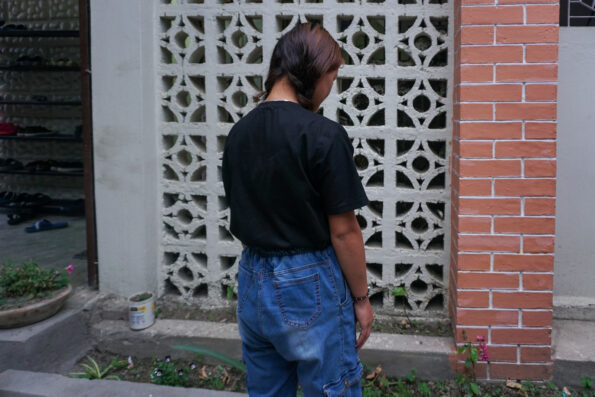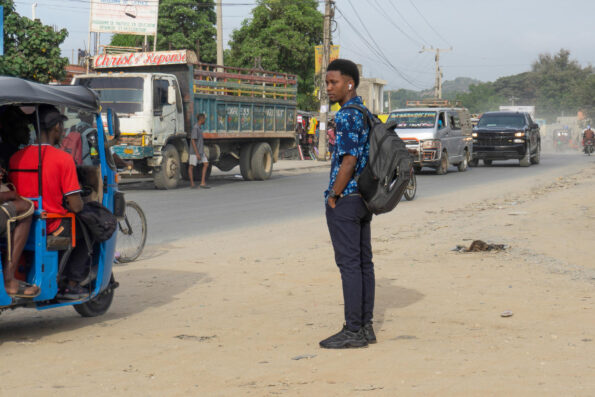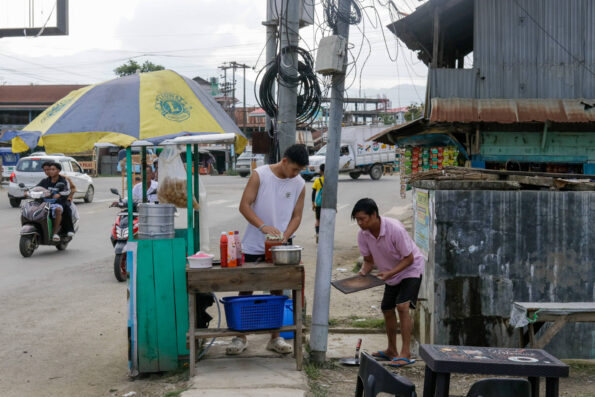
Illustration by Matt Haney, GPJ
JAFFNA, SRI LANKA — Kiritharan Venuja sits in front of her house making garlands to sell, while taking care of one of her four children. Her thoughts are tethered to a time now long past.
“I don’t even have any of my husband’s [clothes] to keep his memory alive. I had asked him to take away all his clothes,” she says, her eyes brimming with tears.
Just over a year ago, Venuja’s husband, Suntharalingam Kiritharan, was still alive. They had been married for 14 years. He owned a vehicle repair shop in Chavakachcheri, their hometown in Jaffna in Sri Lanka’s Northern Province. But he was struggling financially after taking out loans to care for his family and set up the repair shop. It didn’t help that Sri Lanka was in the throes of an economic crisis, burdening him more. So, when a friend mentioned a vehicle repair job opportunity in Canada, Venuja’s husband decided to pursue it.
When he informed her of this plan, Venuja says she resisted at first. She was worried about him leaving his young family behind. But eventually, she agreed halfheartedly. If this worked out, it could mean a better life for their family. The agents organizing her husband’s travel had even promised that, once he settled in Canada, he would be able to move his family there within a year.
“They said that there was nothing to be afraid of. But look at our situation now,” Venuja says. “He has risked his life for us.”
Migration for employment has been a big source of foreign exchange for Sri Lanka since the 1980s, according to a 2020 report by the International Organization for Migration, an intergovernmental agency within the United Nations system. Data from the Sri Lanka Bureau of Foreign Employment shows that the number of people leaving officially to work abroad has been on the rise — over 311,000 in 2022, a 37% increase from the annual average between 2015 and 2019.
Although there are official systems in place for people who want to migrate for work, such as licensed foreign employment agencies, the number of those using official channels has been decreasing. About 75% of those migrating for work in the mid-1990s used licensed employment agencies, according to IOM, but as of 2018, the number was down to one-third. Part of the reason for this decrease is lack of information on legal migration processes.
Recruitment intermediaries or sub-agents are increasingly playing a role, often posing a higher risk of deceptive practices. While Venuja says she didn’t know if the agent trying to help her husband worked with a licenced foreign employment agency, some Sri Lankans have fallen prey to predatory travel agents promising them employment opportunities. They shell out big bucks and attempt risky journeys in overcrowded boats on dangerous waters. Sometimes, authorities intercept these boats and deport travelers back to Sri Lanka. However, there is a growing concern from sources who spoke to Global Press Journal about the lack of adequate systems to assist the returnees and help them rebuild their lives.
Nadarajah Sukirtharaj, coordinator of Jaffna Community Action Center, a nonprofit that works with vulnerable populations, says that although illegal migration was already happening due to poverty after the civil war in Sri Lanka, the trend was exacerbated by the economic crisis that struck the country in 2020.
In her husband’s case, Venuja says the agents informed him he would travel to Myanmar by flight on a visitor’s visa, then to Canada on a cargo boat. But he needed money for a visa to Myanmar, a flight ticket and agent fees. Since he was a repair man, they promised to subsidize his fees, as they might require his services if the ship developed maintenance issues. Venuja’s husband sold his motorcycle. He still spent 400,000 Sri Lankan rupees (1,300 United States dollars) on official documents and 1.6 million rupees (5,198 dollars) on the agents.
On the day her husband left, Venuja says their youngest child was only 2 months old. Her husband seemed happy. He placed his gold chain around the child’s neck. Then, he left. It was the last time she saw him.
On Nov. 6, 2022, local news reported that a fishing vessel was sinking off the coast of Vietnam. Aboard were over 300 Sri Lankans, according to a statement by IOM. The Maritime Rescue Coordination Center in Colombo organized a rescue and temporarily settled them in Vietnam.
Data the Sri Lanka Navy shared with Global Press Journal shows that about 151 of those rescued were deported to Sri Lanka via flight in late December 2022, and another 23 in April 2023.
Venuja would later receive reports that a few protested deportation and two even attempted suicide. One was successful: Venuja’s husband, as she later learned through a call from the Vietnam embassy in Colombo.
“[I didn’t] know what to do. I had decided to die when I heard the news of his death,” she says. “I changed my mind as I saw only four children in front of my eyes.”
No government support
Many who undertake these journeys already know the risks involved, says Sukirtharaj, whose organization has been raising awareness of the risks of illegal travel and the available local resources and opportunities in Kilinochchi, Mullaitivu and Jaffna districts. “It is not that they are unaware of illegal and unsafe [journeys].” But their economic circumstances leave them with very little choice, he adds. “A person who has nothing due to the economic crisis will look for many alternative ways to sustain himself. One of them is illegal foreign travel.”
But a former sales officer from Jaffna — who says he was on the same boat as Venuja’s husband and didn’t want to be identified for fear of getting in trouble with authorities — says he knew little about the risks involved. All he knew is that he’d travel on a big tourist ship and there would be few people on board, he says.
Before his decision to leave Sri Lanka, he worked at a media company, but he made little income given the economic crisis. He flew to Myanmar on a tourist visa, and for the rest of the journey he paid 1.2 million rupees (3,899 dollars) in agent fees, an amount he says varies from person to person. For 70 days, he was in Myanmar waiting to travel to Canada by sea. Agents took care of accommodation and food expenses, he says.
Signs that the agents had deceived him began after they collected his and other travelers’ passports, out of concern they might get into trouble with immigration officials in Myanmar. Agents also told those traveling to destroy phones before boarding the boat to avoid being traced via GPS, the man says. Then, there was the issue of the boat. “It was not a safe vessel for deep-sea [journeys]. It was a type of ship that carried stones and sand for construction works on rivers,” he says.
There were also hundreds of people on board, more than the boat could carry, he adds. But he felt it was a little too late to change his mind.
He describes the next few days as “terror.” It was hot and humid. Many developed seasickness and vomited all over the boat. There wasn’t enough room to sleep. All those on board relied on just two toilets. There was very little food.
About six days into the journey, the vessel began to break down. He says water kept gushing in through a hole in the floor of the boat. The hole grew. The wind and strong waves didn’t help. Day and night, they removed water with buckets, then later a machine pump, but it was too much work, he says. “We couldn’t do it. We were very tired.”
At some point, the ship stopped for several days. When those aboard asked questions, the agents said they were waiting for supplies. “I came to know later that the ship was stationed at the same place to bring on board 65 people from Myanmar,” he says.
By what he estimates to have been the 29th day, the ship began to give out. “I was thinking of so many things. I didn’t even know how to swim,” he says.
They needed help. Although phones were confiscated, someone inside the ship managed to send word outside through a satellite phone.
Word reached Vietnamese authorities, but it took a while for rescuers to locate the boat, given the ocean’s strong waves. “We were brought ashore and kept in a Vietnam camp for a few days,” he says.
He was not comfortable commenting on the death of Venuja’s husband.
Since his deportation to Sri Lanka, the former sales officer says he has received no help from the Sri Lankan government. Instead, he adds, the government has been investigating him. Just a week before this interview, he says someone from the investigation department came to the house and asked some questions.
However, he says that the IOM, which has a migrant return and reintegration assistance program, gave him 1.2 million rupees (4,550 dollars) to help him resettle.
IOM did not respond to multiple requests for comment.
The man says he doesn’t plan to attempt that kind of journey again. “Everyone knows that illegal immigration is a crime in Sri Lanka,” he says.
Sivagnanam Shritharan, a member of Parliament representing Jaffna and Kilinochchi, says that the Sri Lankan government does not provide any assistance to those who travel illegally and are deported, but instead imprisons them or monitors them. “They are always watching them like snakes,” he says.
He adds that the government will sometimes refuse to bring back bodies of migrants if they die during an illegal journey, fearing that it might bring shame to the country.
This was the case with Venuja’s husband. Venuja says she had to rely on well-wishers to bring back her husband’s body so she could bury him. “In the end, only my husband’s body remained,” she says.
Nihal Thalduwa, deputy inspector general of police, confirmed that police monitor returnees and gather information about them. He did not give a reason for the monitoring or indicate what kind of information they gather.
Better safeguards
The increase in illegal immigration and shady agents highlights the urgent need for better safeguards and support systems, says Manusha Nanayakkara, minister of Labor and Foreign Employment.
“No system was put in place to protect the businesses within the country and protect the jobs of the workers. Due to this, due to job loss and the economic condition of the country, many people started going abroad for work,” he says. This has led to an increase in traffickers claiming to offer foreign jobs, he adds.
Nanayakkara adds that some people knowingly become targets for fraudulent agents, while others lack awareness. But the government is making efforts to address the issue in various ways. For example, the employment bureau is running awareness campaigns through social media and mainstream media and is working closely with the police.
Amendments to the Sri Lanka Bureau of Foreign Employment Act are also currently in the final stages of review, Nanayakkara says. According to minutes from the 11th Committee on the Protection of the Rights of All Migrant Workers and Members of Their Families, the amendments are “to provide better protection of the rights of migrant workers and to punish persons who violated those rights.”
While Nanayakkara sees the need for better job opportunities for Sri Lankans, he says that people should use legal means if they want to work abroad. “You must legally obtain a work visa and register with the Foreign Employment Bureau.” He adds that Sri Lanka has an integration program for returnees, but only those who left the country after registering with the bureau. “We can only help those who have legally gone and [were] deported for various reasons,” he says.
However, he sees the need for a program to reintegrate those who immigrated illegally. “We don’t have legal provision for that. This is something we have to seriously consider in the future,” he says.
Another solution, says Sukirtharaj, from Jaffna Community Action Center, is for the government to put policies in place that guarantee jobs for young people, adding that universities admit too many students who graduate to an oversaturated job market.
“As we weaken more and more economically, the opportunities for illegal foreign travel are increasing,” Sukirtharaj says.
Good intentions?
Meanwhile, a source whose son boarded the same boat as Venuja’s husband holds a slightly different perspective about agents and their methods. He says agents are only trying to help people who are struggling. “They sent the people as per our request.”
He requested to remain anonymous to protect his son’s identity, for fear of his son getting into trouble with the authorities, who he claims have been monitoring him closely. The only reason he let his son leave was because he trusted the agents. Authorities intercepted his son, who is 21, and deported him back to Sri Lanka. The young man has yet to receive any assistance from the government, but the father says IOM gave his son 37,900 rupees (123 dollars) to resettle.
For now, his son has enrolled in an Applied Science degree program. The father worries his son will blame him for everything that’s happened. “This will affect him for the rest of his life.”
Vijayatharsiny Thinesh is a Global Press Journal reporter based in Jaffna, Sri Lanka.
TRANSLATION NOTE
Lohith Kumar, GPJ, translated this article from Tamil.







